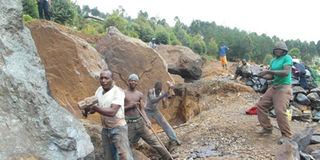Consider people’s views, liberalise iron ore processing

A section of workers break rocks at the iron ore mines at Rwara Hill in Hamurwa Town Council, Rubanda District recently. FILE PHOTO
What you need to know:
- The districts of Kisoro, Kabale and Rubanda have vast deposits of iron ore.
- Kigezi sub-region leaders have appealed to government to establish an iron ore processing factory in the area as President Museveni pledged in 2016, or open up the trade to other investors.
- Locals should be given the opportunity to benefit from iron ore as a business.
Kigezi sub-region leaders have appealed to government to establish an iron ore processing factory in the area as President Museveni pledged in 2016, or open up the trade to other investors.
Until 2016, the Iron Ore Dealers Association (IODA) used to employ more than 200 youth. But this is no longer possible due to the closure of the factory in Jinja. According to IODA, Kamuntu Investments Ltd, whose licence was issued in 2015, is the only company licensed to export iron ore mined from the sub-region.
The districts of Kisoro, Kabale and Rubanda have vast deposits of iron ore. Bukimbiri Sub-county in Kisoro, Hamurwa Sub-county in Rubanda and Northern Division and Buhara Sub-county in Kabale have huge iron ore deposits, but majority of the former employees in the iron ore mining sector are now jobless and some have returned to non-paying subsistence farming.
Our take is that government should not only fulfil the 2016 presidential pledge of constructing an iron ore factory in the area, but also award export licences to other investors. This will help to harness the redundant resource and also provide jobs to unemployed youth.
Government must also liberalise this business and help willing businesspeople invest in mining and processing iron ore through availing them with low-cost land, putting in place the necessary infrastructure such as roads and electricity; and a more enabling environment in terms of legislation and licensing.
Investing in emerging markets such as Uganda can sometimes be an impossible task if there are several barriers to entry. Barriers can include tax laws, foreign investment restrictions and legal issues. The liberalisation process begins by relaxing these barriers and surrendering some control over the direction of the economy to the private sector.
But even when liberalised, government must discourage the exportation of iron ore in its raw form because this denies the community and government several economic benefits.
If the situation remains unchanged, unscrupulous people will come up to exploit the resource outside established rules. And this is bad because government will lose revenue in uncollected taxes, workers will be exploited by owners of the iron ore businesses and lives will always be in danger.
We think that locals should be given the opportunity to benefit from iron ore as a business. There should be deliberate efforts by government to facilitate proper mining of this ore through opening up space for more interested players, proper licensing procedures and supervision of the miners.
When all this is done, dealing in iron ore as a business has the potential to improve economic lives of many people in the host communities. Let iron ore mining, processing and trading be put in the hands of many players.




